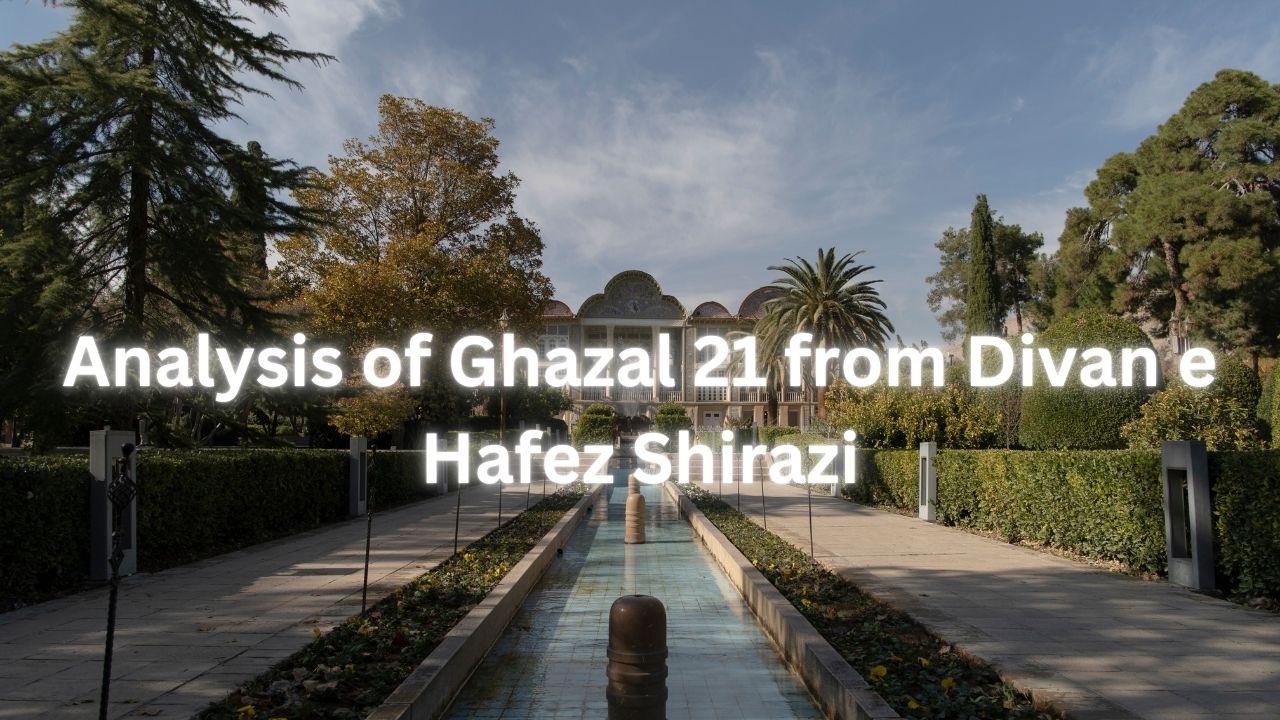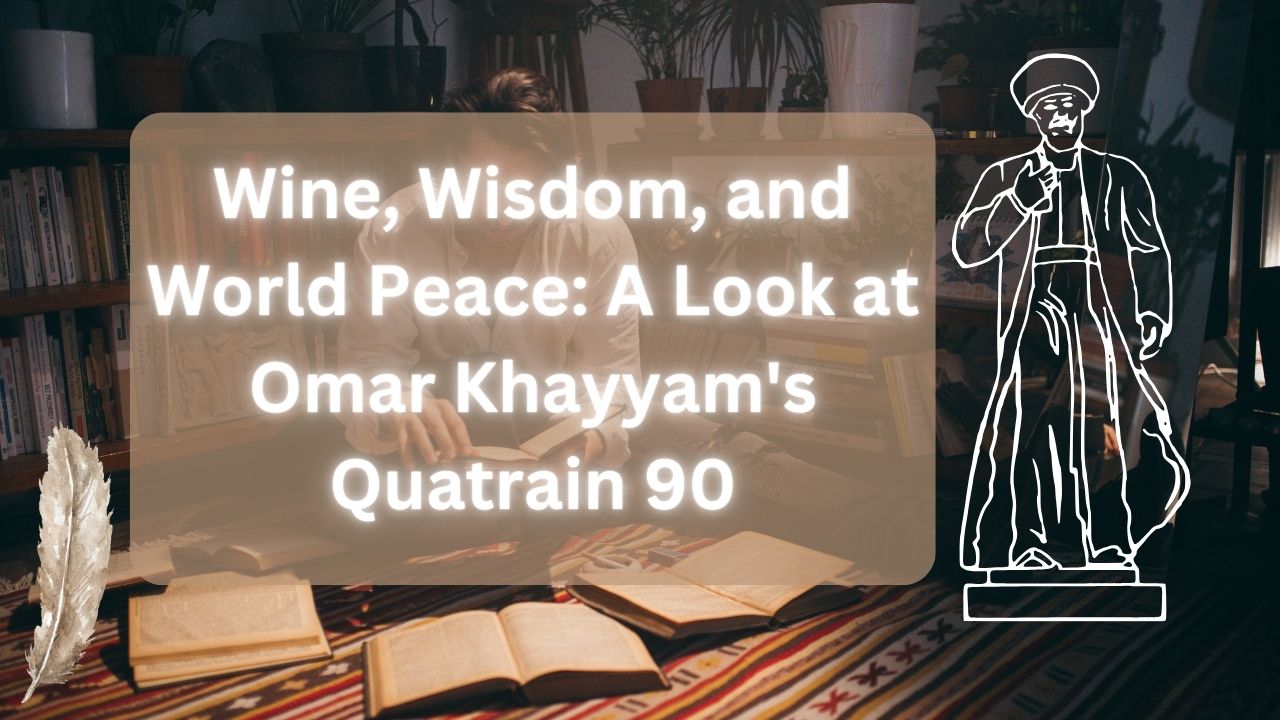دل و دینم شد و دلبر به ملامت برخاست
گفت با ما منشین، کز تو سلامت برخاست
Translation:
My heart and faith were lost, and my beloved rose in reproach, Saying, “Do not sit with us, for you have lost your peace.”
Literal Translation:
My heart and faith were destroyed in the path of love (I was driven to madness), and my beloved reproached me, saying:
-
“Stay away from me, for you have lost your peace and well-being.”
Explanation:
This ghazal describes a state of love, a lamentation of failure. The poet expresses his thoughts in the language of Hafez. Although the poem begins with complaints and grievances, Hafez, as always, quickly shifts to praising the beauty of the beloved. Hafez believes that complaints and grievances are not appropriate in love and that whatever the beloved does is a blessing and their decree.
Here, Hafez warns his audience that in love, it is not the case that as soon as the lover loses their heart and faith, they achieve their goal and reach the destination of union! No, this is just the beginning of the journey, and one must endure disgrace, suffer heartaches, and sacrifice lives to earn the worthiness of sitting with the beloved. Love seems easy at first, but as one progresses, problems gradually appear. It is astonishing that in love, everyone follows the same path. They fall in love easily, but soon they encounter difficulties. The famous Sheikh San’an is a prime example of a lover struggling with the obstacles and challenges of love. After seventy years of worship, he easily falls in love with a non-Muslim girl. The beloved initially asks him to renounce his faith, and Sheikh hesitates, marking the first problem, and so on…
Yes, love is but one story, but it is never repetitive, no matter who tells it! Hafez, too, has given his heart and faith, but he still has a long way to go to reach his destination.
In this ghazal, the poet uses the word “rose”
(برخاست) with different meanings in each verse.
دل و دینم شد: My heart and faith were lost.
به ملامت برخاست: Began to reproach me with displeasure.
از تو سلامت برخاست: You have lost your peace.
Meaning of the verse: I lost my heart and faith in the path of love for the beloved, but the beloved said: “You have lost your peace; it is not appropriate for you to sit with us!”
The beloved always finds an excuse and sets conditions to test the lover! Just as the non-Muslim girl set many conditions for Sheikh San’an. O Hafez, you have a long way to go; you must fulfill other conditions one by one to achieve your goal.
Of course, Hafez is not a lover who would retreat and surrender in the face of these obstacles and challenges!
که شنیدی که در این بزم، دمی خوش بنشست؟
که نه در آخرِ صحبت به ندامت برخاست
Translation:
Who has ever heard of anyone in this gathering, Who did not end up in regret after a moment of joy?
Literal Translation:
Have you ever heard of anyone in the gathering of this world who enjoys a moment of happiness, And does not leave the assembly in the end with regret!?
Explanation:
Hafez, with a tone of regret and sorrow, addresses his passionate heart: “O heart, do not despair, this is the way of love. Who have you heard of that sat in this gathering of love (embarked on this path) and did not rise in regret and remorse at the end?”
The challenges and obstacles in the path of love are so numerous and exhausting that not everyone can endure, and many soon give up. Earthly love is no different; the journey is the same. When someone falls in love, initially, they see everything as beautiful and dreamy, and they become overwhelmed with emotions, singing love songs, making grand gestures, and making extravagant claims, assuring the beloved that they will give the world for them. Like legendary heroes, they take up a pickaxe and start digging mountains, carrying the world on their shoulders and boasting about their feats. However, as they progress in the journey of love, they realize that love is not all about pleasure but more about suffering and effort. They must often forgo their own desires to act according to the beloved’s wishes. Doubts begin here. There come times when they must sacrifice, give up their own pleasures (like hanging out with old friends, abandoning their own dreams, etc.) to fulfill the beloved’s desires. It is clear that these are difficult and breaking points, and few can remain steadfast and dedicate all their efforts to pleasing the beloved. This is why most loves end in failure and separation.
شمع اگر زان لبِ خندان به زبان، لافی زد
پیشِ عشاقِ تو شبها به غَرامت برخاست
Translation:
If the candle boasted of those smiling lips, It stood all night in penance before your lovers.
Literal Translation:
If the candle laughed with its flame and boasted of matching the beloved’s smiling lips, It paid the price for this nonsense until morning (standing in the gathering of your lovers) and burned.
Explanation:
Continuing from the previous discussion, in the path of love, one must toil, endure suffering, and pay the price. In the delicate view of the poet, even the candle pays the price in the path of love and is in the process of compensating.
Meaning of the Verse: The candle, too, saw the smiling face of the beloved in the gathering and wanted to imitate it, to smile and be attractive like the beloved. (In the poet’s view, the dance of the candle’s flame is because it tries to resemble the beloved’s smiling face.) The candle, for this audacity, is punished and is compelled to burn from night till dawn, illuminating the lovers’ gathering.
در چمن، بادِ بهاری ز کنار گل و سرو
به هواداریِ آن عارض و قامت برخاست
Translation:
In the garden, the spring breeze passed by the rose and cypress, In admiration of that face and stature.
Literal Translation:
When the spring breeze saw the beautiful face and graceful stature of the beloved, It left the embrace of the flowers and cypress in the garden and rushed towards the beloved.
Explanation:
The beloved’s beauty has spread everywhere and influenced everything. The term “admiration” (هواداری) is used to enhance the elegance of the words, making the breeze’s twist more tangible and the air more perceptible. Hafez is the only poet who meticulously adheres to these criteria in word selection.
Meanings:
-
Admiration (هواداری): Love, desire, hope. Given the context of the breeze, spring, garden, flowers, and cypress trees, the word “admiration” is used to enhance the elegance of the words.
-
Face (عارض): Face, visage.
Meaning of the Verse:
In the garden, the spring breeze passed by the cypress and flowers, rising in love and admiration for your face and stature. The beloved’s face contrasts with the flowers, and their stature with the cypress. The beloved’s face and stature have outshone the flowers and cypress, even attracting the spring breeze’s attention.
مست بگذشتی و از خلوتیانِ ملکوت
به تماشایِ تو آشوبِ قیامت برخاست
Translation:
You passed by intoxicated, and from the secluded ones of the heavens, A tumult of the Day of Judgment arose in your sight.
Literal Translation:
You displayed the splendor of love with intoxication, and the secluded ones of the heavens (a metaphor for angels, who themselves are symbols of beauty and grace),
-
Raised a tumult of the Day of Judgment to behold you.
Explanation:
The beauty of your radiant face, as you passed by joyfully and coquettishly, stirred everything and everyone into a frenzy. Even the angels and celestial beings became agitated and eager, scrambling not to miss the sight of you. You caused such an uproar that it seemed as if the Day of Judgment had arrived!
پیشِ رفتار تو پا برنگرفت از خِجلت
سروِ سرکش که به ناز از قد و قامت برخاست
Translation:
In shame, the proud cypress did not lift its foot, Before your graceful walk and elegant stature.
Literal Translation:
In the face of your delightful demeanor, out of embarrassment,
-
The proud and graceful cypress, which boasted of its tall stature, stood still.
Explanation:
-
Graceful walk (رفتار): Walking with elegance and pride.
-
Proud cypress (سرو سرکش): The tall and proud cypress tree.
-
Could not stand (پا برنگرفت): Could not remain standing.
The cypress, which boasted of its height and elegance, could not stand in shame when it saw your graceful walk. Its stature bent and broke in embarrassment.
حافظ این خرقه بینداز مگر جان ببری
کآتش از خرقهٔ سالوس و کرامت برخاست
Translation:
Hafez, cast off this cloak unless you wish to save your life, For fire has risen from the cloak of hypocrisy and false piety.
Literal Translation:
Hafez, cast off this cloak (the garment of hypocrisy) to save your life,
-
For fire has risen from the cloak of deceit (the garment of hypocrisy) and their false miracles.
Explanation:
-
Robe (خرقه): The garment of Sufism, a symbol of piety.
-
Hypocrisy (سالوس): Deception and insincerity.
-
False piety (کرامت): Acts of supposed miraculous deeds, often deceitful.
Hafez’s disdain for the robe, which symbolizes piety, is evident throughout his poems. He believes that true piety and chastity do not require a specific garment or symbol. Wearing the robe loudly proclaims one’s piety and virtue, which fosters hypocrisy and deceit. Hafez advises to discard the robe to avoid the hellfire that arises from the deceit and false piety associated with it. By doing so, one can become a true human and blend in with others without drawing attention through the robe.





